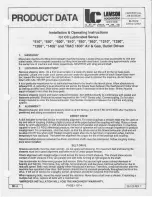
•
Make sure that the machinery and surrounding area is
clear before operating. Do not activate the remote control
system until certain that it is safe to do so.
•
Power can be removed from the RF2CAN and TEC2403
controllers by removing the source power from the
circuit.
•
Use a damp cloth to keep units clean. Remove mud,
concrete, dirt, etc. after use to prevent obstructing or
clogging the buttons, levers, wiring, and switches.
•
Do not allow liquid to enter the remote control or base
unit enclosures. Do not use high pressure equipment to
clean the remote control or base unit.
•
Disconnect the RF2CAN and TEC2403 controllers
before welding on the machine. Failure to disconnect the
controllers may result in destruction of or damage to
the controllers.
•
Operate and store units only within the specified
operation and storage temperatures.
Towing
•
Check with your local county or state safety towing
regulations, in addition to meeting Department of
Transportation (DOT) Safety Towing Regulations, before
towing the debris blower.
•
In order to reduce the possibility of an accident while
transporting the debris blower on public roads,
always
make sure the towing vehicle is mechanically sound and
in good operating condition.
•
Always
shutdown engine before transporting.
•
Always
inspect the hitch and coupling for wear.
Never
tow the debris blower with defective hitches, couplings,
chains, etc.
•
Check the tire air pressure on both towing vehicle and
debris blower. The debris blower tires should be inflated
to 241 kpa (35 psi) cold. Also, check the tire tread wear
on the vehicle and debris blower.
•
Always
properly attach debris blower’s safety chains to
towing vehicle.
•
Always
make sure that the towing vehicle's directional,
backup, and brake lights are working properly.
•
Do not tow the machine faster than 88 km/h (55 mph).
Recommended off-road towing is not to exceed 24 km/h
(15 mph) or less depending on the type of terrain.
•
Avoid sudden stops and starts. This can cause skidding,
or jack knifing. Smooth, gradual starts and stops will
improve towing.
•
Avoid sharp turns to prevent rolling.
•
Make sure the blower chute is pointing up when towing.
•
Place chock blocks underneath wheel to prevent rolling
while parked.
Maintenance and Storage
•
Let engine cool before storing and do not store near
flame.
•
Shut off fuel while storing or transporting. Do not store
fuel near flames or drain indoors.
•
Park machine on level ground. Never allow untrained
personnel to service machine.
•
Use jack stands to support components when required.
•
Disconnect battery or remove spark plug wires before
making any repairs. Disconnect the negative terminal
first and the positive last. Reconnect positive first and
negative last.
•
Remove the key from the ignition switch to prevent
accidental starting of the engine when servicing, adjusting,
or storing the machine.
•
Perform only those maintenance instructions described in
this manual. If major repairs are ever needed or assistance
is desired, contact an Authorized Toro Distributor.
•
To reduce a potential fire hazard, keep the engine free of
excessive grease, grass, leaves, and accumulations of dirt.
Never wash a warm engine or any electrical parts with
water.
•
Be sure that the machine is in safe operating condition by
keeping nuts, bolts, and screws tight. Check the fan shaft
bearing mounting bolts and nuts frequently to be sure
that they are tightened to specification.
•
If the engine must be running to perform a maintenance
adjustment, keep hands, feet, clothing, and other parts of
the body away from the fan and other moving parts.
•
Do not over speed the engine by changing the governor
settings. To be sure of safety and accuracy, have an
Authorized Toro Distributor check the maximum engine
speed with a tachometer.
•
The engine must be shut off before checking the oil or
adding oil to the crankcase.
•
Keep hands and feet away from moving parts. If possible,
do not make adjustments with the engine running.
•
Charge batteries in an open well ventilated area, away
from spark and flames. Unplug charger before connecting
or disconnecting from battery. Wear protective clothing
and use insulated tools.
•
Keep all parts in good working condition and all hardware
tightened. Replace all worn or damaged decals.
•
Use only Toro approved attachments. Warranty may be
voided if used with unapproved attachments.
Hauling
•
Use care when loading or unloading the machine into a
trailer or truck.
6







































